Fighting Talk is your personal course in inclusive and accessible communication. Thank you for reading!
Free subscribers can read everything when it comes out.
After 1 week, it goes behind a paywall.
If you need me to comp you a paid subscription, let me know. I’ll send you a free one, no questions asked.
Content warning: details of sexual violence.
Hi friends,
I spent six wonderful years helping to run a charity called the Schools Consent Project (SCP). They teach young people about sexual consent.
I love love love the SCP and their mission, and I’m thinking about it a lot at the moment since April is Sexual Assault Awareness Month.
So I’m sharing the history of a powerful movement against sexual violence, that’s been co-opted and corrupted.
You guessed it. Me Too.
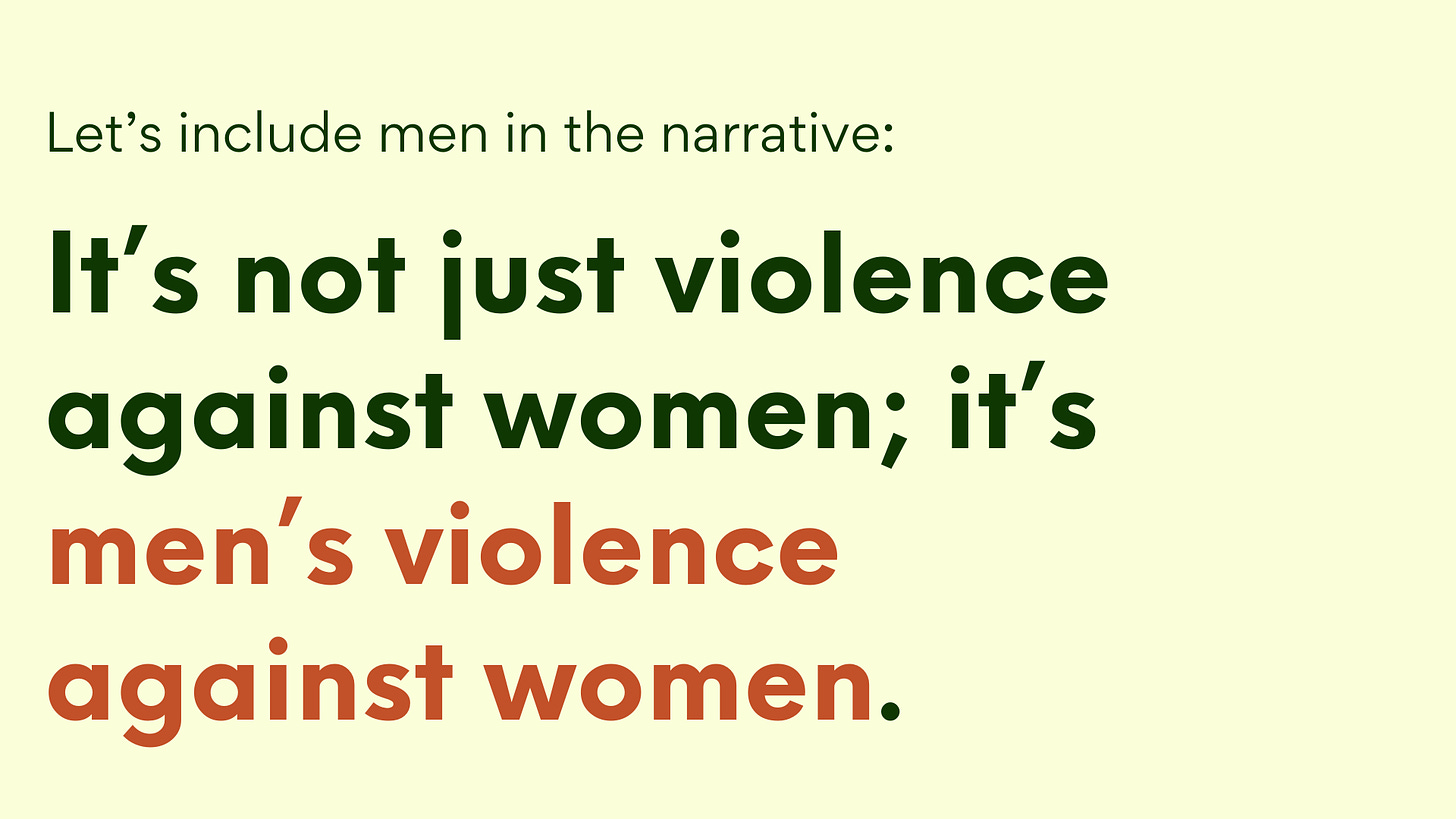
“‘Me too’ was just two words; it's two magic words that galvanized the world.”
- Tarana Burke, Founder, me too.
2006: Tarana Burke
Think of the Me Too movement and you probably picture Twitter blowing up in 2017.
Tarana Burke coined the phrase in 2006.
Yep, 11 years earlier!
And she wasn’t focused on Hollywood actors.
Tarana Burke created Me Too to support survivors of sexual violence.
She especially wanted to support women of colour living in low-wealth communities.1
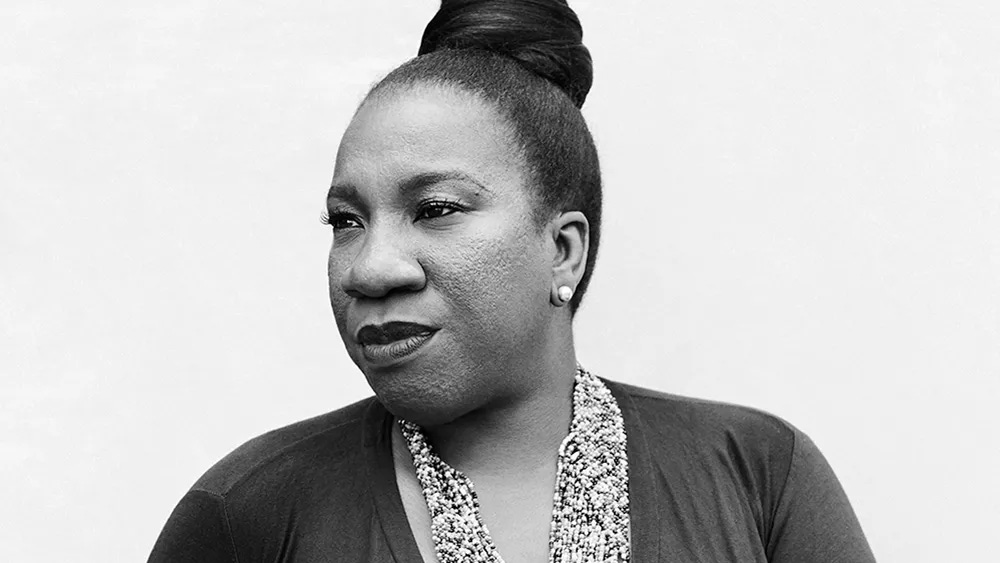
For a lot of us, Me Too didn’t enter The Feminist Lexicon until 2017.
Why? That’s when it went viral on social media. That’s when the movement was co-opted - oops sorry, I mean “transformed” - by famous white women.2
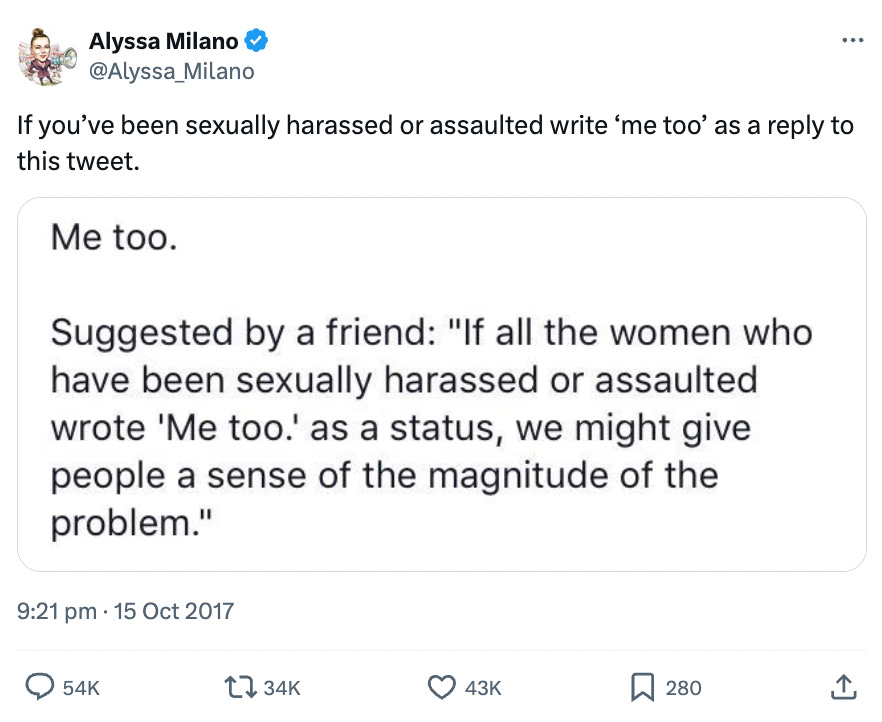
2017: #MeToo
Within 24 hours, Alyssa Milano’s tweet got 12 million responses.
It shone a spotlight on men’s violence against women across the world.
As women shared experiences of their jobs in Hollywood, media outlets, law firms and so on, public figures were finally called out.
Heads of companies were fired left, right and centre.
A win for women? Yes and no.
White women take over #MeToo
Within hours, the face(s) of the movement looked like this:
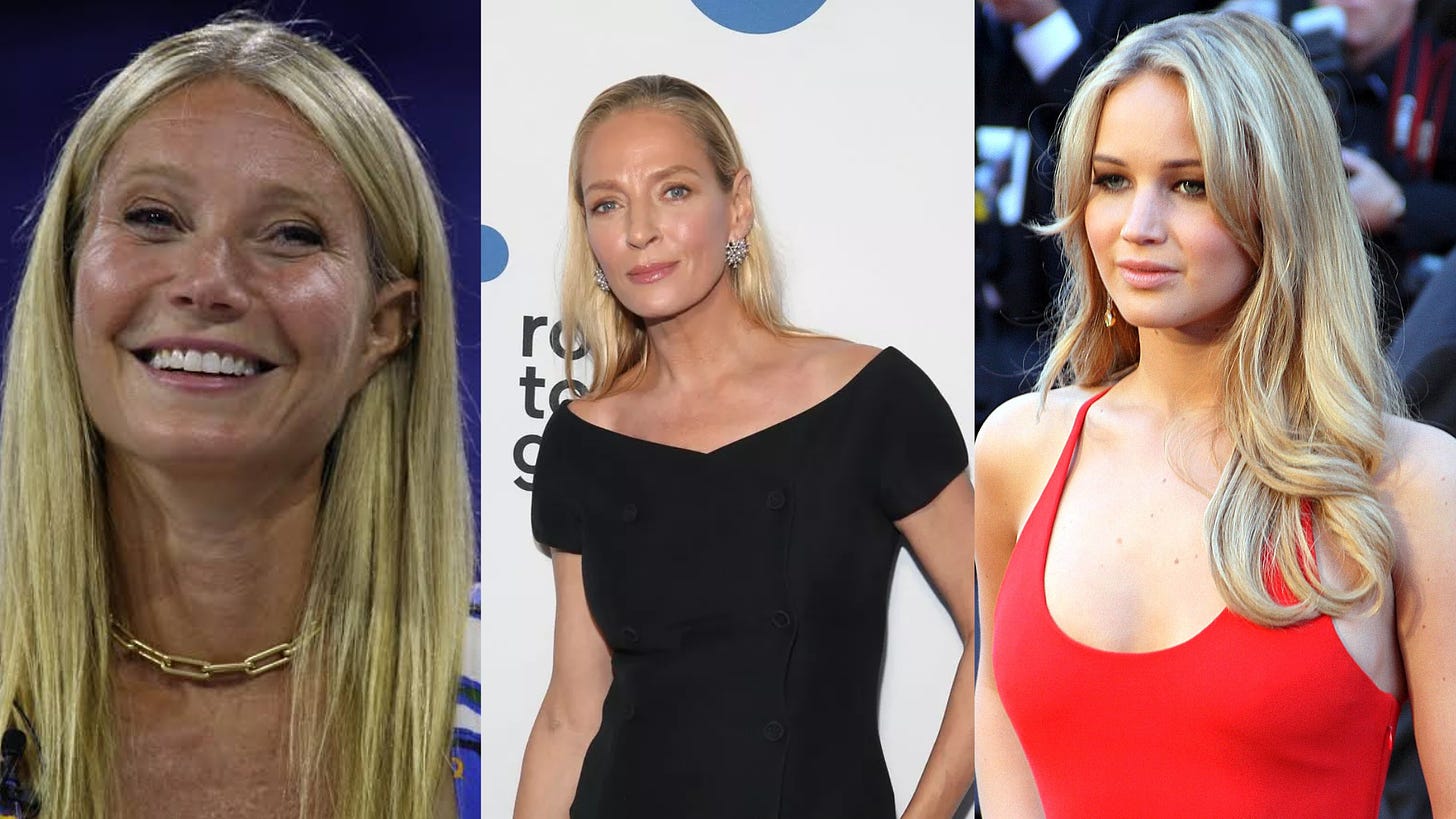
#MeToo told a story: mostly about young, white, not-yet-disabled, wealthy, middle and upper-class women.
So, here we are again.
A Black woman started a movement to support Black and racially minoritised women… and then white women grabbed the narrative and twisted it to suit our needs.
Sound familiar?
“Elite women are, and always have been, the trendsetters for feminism. They will dictate the decor in the proverbial ‘room of one’s own.’” - Koa Beck, White Feminism
2018: the response
All too often, liberation movements get turned into money-making opportunities.
Someone (usually a man) just has to turn a profit off it.
Take the clothing brand Feminist Apparel. The T-shirts say “riots not diets” but it’s more like a smokescreen for some sexist dudes who want to make money off feminism .
1. The bottom line is the bottom line
Just how quickly can a potentially radical movement get watered down into a cash grab? Let’s find out.
In 2018, Yahoo! Finance called #MeToo a “boon” for big law firms, who saw it as a convenient revenue generator.
The same year, the New York Times reported: “Companies that offer money to plaintiffs in anticipation of future legal settlements are racing to capitalize on sexual harassment lawsuits.”
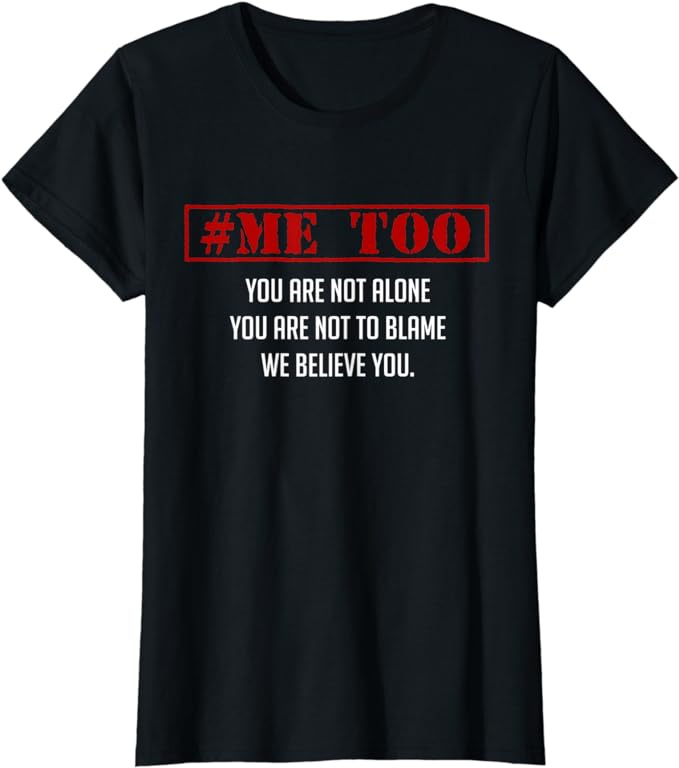
Spotted reported that supporting #MeToo was helpful to a celebrity’s brand.
“I think there’s a little bit of a misperception that celebrities involved were putting themselves at risk by being outspoken, but the data shows the opposite. Consumers feel that they’re more relatable.” — Janet Comenos, CEO of Spotted
And Amelia Hall (associate director of cultural strategy at TBWA Backslash) spoke about the profits that could potentially be had from “#MeToo brand activation’.
Blurgh.
People see a horrific number of women who have been sexually assaulted by men.
Brands see a fresh opportunity to make a profit.
“But what kind of victim can pursue the legal avenues of abuse at the expense of their job? A financially secure one. Also known as the merging of white feminism and #MeToo.” - Koa Beck, White Feminism
2. What about men?
Donald Trump said the Me Too movement made him worry more about his son than his daughter.
Others described feeling increasingly worried that a “night of fun” could end up in a “prison sentence, the loss of their job or expulsion from an educational facility.”3
Ahem. Let’s fact check that.
Channel 4’s investigation reports that:
Research by Mankind UK estimates that between 1 in 6 and 1 in 10 men have experienced some kind of sexual abuse,
A man in the UK is 230 times more likely to be raped himself than be falsely accused of rape,
The average adult man in England and Wales has a 0.0002% chance of being falsely accused of rape in a year.
So yeah, false reports can happen. This is true of everything.
But no, dudes don’t need to be particularly worried about it.
When we fixate on the vanishingly small risk that a man might be falsely accused, we’re saying we care more about hypothetical men’s futures than real survivors’ (usually women and marginalised genders) presents.
“Focusing on what alleged predators are losing as opposed to what victims need has always been a deeply flawed framework for understanding or presenting systemic abuse.” - Koa Beck, White Feminism
3. Tarana Burke’s TED Talk
In her im-pecc-ab-le TED Talk, Tarana Burke says the movement she started is “unrecognisable” thanks to its media portrayal.
What happened?
#MeToo was framed as a witch hunt. “Suddenly a movement to centre survivors of sexual violence is being talked about as a vindictive plot against men.”
Tarana Burke speaks of her vision for the future of Me Too. She wants it to be “part of a collective vision to see a world free of sexual violence.”
She believes we can build that world.
Men, you’re included in that. 💛
If Tarana Burke believes it, I do too.
2019: who’s voices were heard?
Me Too has real-life consequences for men who abuse their power and sexually assault women.
But the consequences aren’t the same for everyone.
Let’s play a game of Spot the Difference:
R. Kelly sexually, mentally and physically abused Black women and girls of colour.
The news broke 3 months before the news about Harvey Weinstein.
Which one did you hear more about?
I’m gonna guess you heard a ton more about Weinstein’s survivors.
Why? According to Leung and Williams (2019), the media focused on prominent white women.
The non-famous Black women and girls who survived abuse from R. Kelly “struggled to make their voices heard.”
“These families came forward, and were making desperate pleas to get their children back, to get their daughters back home and away from R. Kelly. We’ve been watching them since they came forward in 2017 to try various attempts to get the media attention but it doesn’t take hold, and again I think that goes back to this idea that Black girls don’t matter. They don’t matter enough, and it’s proven over and over again.” - Tarana Burke
Sexual violence thrives thanks to racism, classism, ableism (and more).
These -isms designate some people “model victims” (the famous, white, wealthy, not-yet-disabled women like Gwyneth Paltrows and Jennifer Lawrences) while others are seen as easy to ignore.
It’s deeply intertwined with gender inequities, yet countless victims’ stories tell us that gender isn’t the stand-alone issue here. Sexual violence is connected to racial, class, socioeconomic and other inequities, too.
Minoritised victims are delegitimised
Young, white, middle and upper class, conventionally attractive4 women are the “predominant image” of sexual abuse victims.
(And if they’re famous, and able to use social media to call out their abusers, even better).
What about minoritised and marginalised folks? Let’s look at the stats.
For every Black woman who reports a rape, there are at least another fifteen who don’t.
More than 1 in 5 Black women experience rape. Devastatingly, Black women are less likely to be believed than their white counterparts.5
Indigenous women in the United States are two-and-a-half times more likely to be sexually assaulted than non-Indigenous women.
Women with learning disabilities and mental health conditions are more likely to experience sexual violence.
Transgender people are over four times more likely than cisgender people to be victims of violent crimes, including sexual assault.
Disabled women are four times more likely to experience sexual assault than not-yet-disabled women.
More than 1 in 5 Black women experience rape. Devastatingly, they’re less likely to be believed than white women.
Racism. Classism. Heterosexism. Cissexism. Ableism. All these -isms overlap.
(That’s intersectionality, coined by the incredible Kimberlé Williams Crenshaw).
Together, they form “barriers against believability” for:
trans, non-binary and gender-non-conforming people,
people of colour,
refugees and migrants,
economically exploited folks (people living in poverty)
and many others.
“Me Too is not just a movement for famous white cisgendered women.” - Tarana Burke
Just to clarify: I’m not ranking victims of sexual assault. Sexual violence is always wrong.
2018-2021: How much progress?
#MeToo played a key part in waking up the world to the magnitude of sexual violence.
Since the hashtag went viral in 2017, we’ve seen a few changes.
There’s been a smidge of progress in recognising how widespread workplace harassment is.
“As a result of increasing incidents of sexual harassment coming to light, the government pledged to enhance safeguards for victims of harassment by making changes to the law surrounding harassment in the workplace.”
And there’s been more and more recognition that #MeToo wasn’t exclusively about white women. Some white actors in Hollywood invited women of colour activists - including Tarana Burke - to walk the red carpet of the Golden Globe Awards in January 2018.
Cool. But there’s a ton of work left to do.
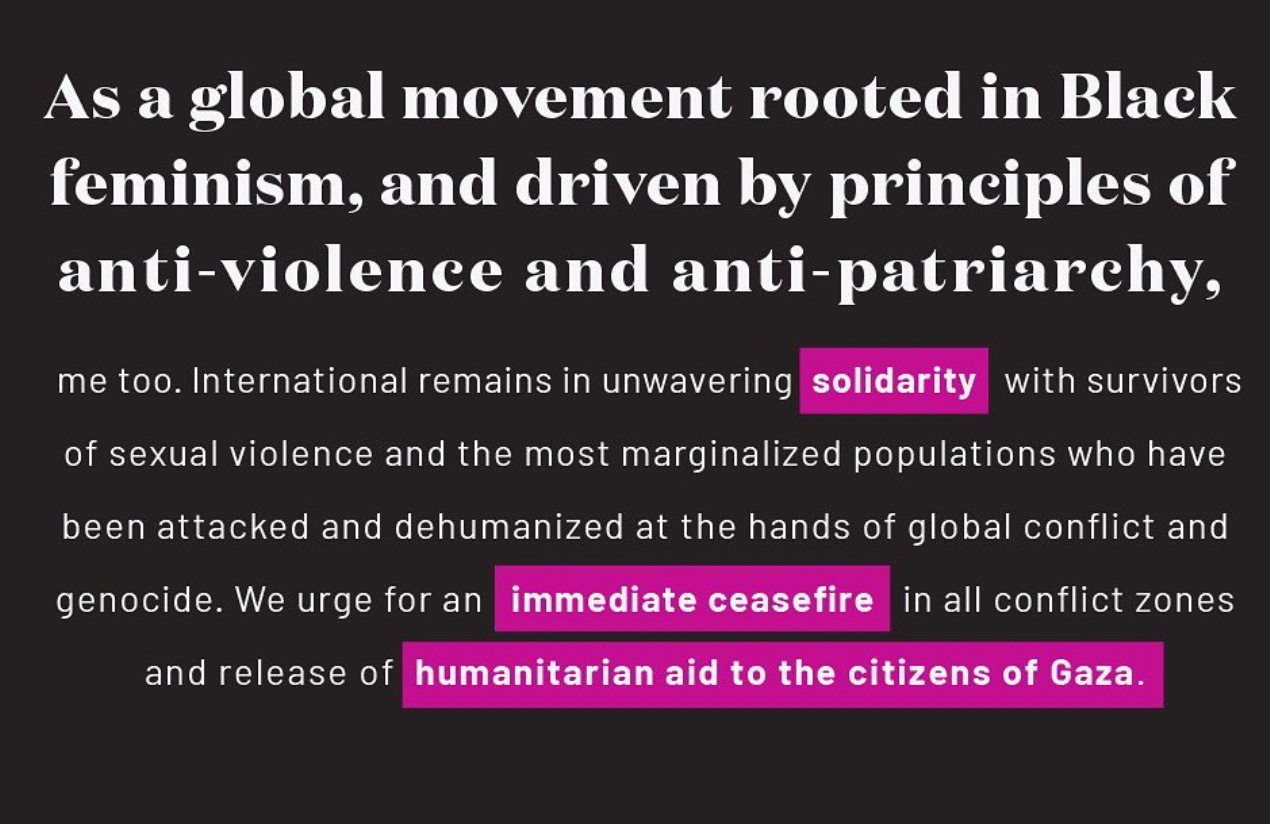
2024: Palestine too
Me Too doesn’t come with an asterisk saying *only some survivors.
If you care about sexual violence survivors, you can’t use the experiences of Israeli survivors as a weapon to attack Palestinians.
You can’t say “what about the violence against Israeli hostages” if you fail to acknowledge the decades-long sexual abuse and exploitation of Palestinian women.
“Whatever is currently happening to humanity, it is happening to all of us. No matter how hidden the cruelty, no matter how far off the screams of pain and terror, we live in one world. We are one people.” - Alice Walker
If you can, donate to Women for Women International - they provide women in Gaza with meals, clothes, hygiene kits and counselling hotlines.
Keep writing to your representatives.
If you’re in the UK, join No Tax For Genocide and pledge to withhold your income and council tax.
Keep pushing for a permanent ceasefire.
The horrors of war cannot justify the use of sexual violence as a means of warfare, and it is our collective responsibility and mission to advocate for the eradication of this suffering and continue the fight toward a more equitable world for all, regardless of sex, race, nationality or class. - Me Too.
Survivors of sexual violence can be any gender. Men’s violence against women tends to target women, and other marginalised genders, but it can affect anybody.
Please read “transformed” with its intended sarcasm.
Lauren Windle, ‘Notes on Feminism’ (2024).
According to Eurocentric standards.
Lauren Windle, ‘Notes on Feminism’ (2024).







Stealing the narrative in order to uphold the power of the ruling class is a dirtbag and all-too-common strategy. Thank you for calling it out 🔥
I love the arch of argument and how you trace minimisation of sexual violence against Palestinian women to the hijacking of #MeToo by white feminism. Thanks!